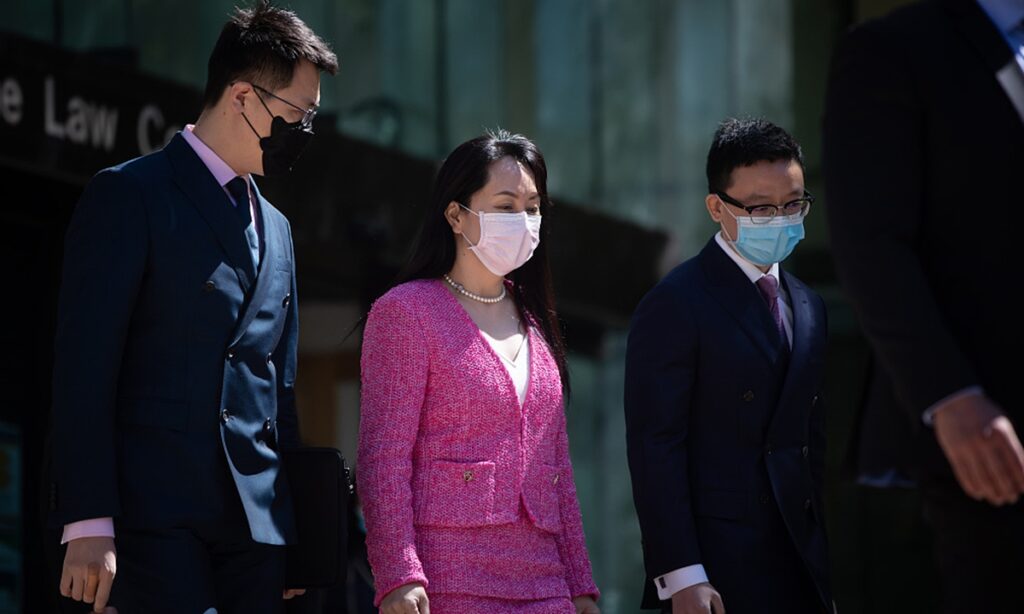A Canadian media report on the US Justice Department resuming negotiations with the defense team of Chinese national and Huawei executive, Meng Wanzhou, about a possible deferred prosecution agreement (DPA) could be the most promising way for Meng to safely return to China, but US demand for a guilty plea could complicate things as the Chinese side has insisted on Meng’s innocence and rejected US long-arm jurisdiction, Chinese legal experts said on Sunday.
While the reported resumption of talks showed that relevant parties hold an open attitude toward resolving the high-profile case; however, compromise is necessary, particularly on the part of the US, to ensure a possible agreement is acceptable for all parties, experts said.
The US Justice Department has resumed talks with Huawei Technologies and Meng’s defense team about a possible DPA that could allow Meng to return to China, Canadian newspaper, the Globe and Mail, reported on Friday, citing unidentified sources.
While the reported negotiations for a possible DPA could be the most promising way for Meng to safely return to China, the US Justice Department’s demands that Meng pleads guilty and pays a hefty fine could complicate things, as the Chinese side has repeatedly stressed Meng’s innocence, Chinese legal experts said.
“It’s not accurate to consider a DPA as a guilty plea agreement, as DPA is a commonly used arrangement between prosecutors and entities or individuals to resolve relevant matters, and it also depends on how the Department of Justice addresses Meng’s case as it’s widely considered a political prosecution and the Chinese side believes in her innocence and rejects US long-arm jurisdiction,” Huo Zhengxin, a law professor at the China University of Political Science and Law, told the Global Times on Sunday.
The reported talks show that the parties hold an open attitude toward reaching a certain agreement or finding a solution, Li Haidong, a professor at the Institute of International Relations of China Foreign Affairs University, told the Global Times on Sunday.
However, Li believed that any agreement is based on the conditions accepted by both sides, and if the Justice Department includes both the guilty plea and a hefty fine as conditions of the agreement, the agreement may not be acceptable to Meng’s team nor the Chinese side.
According to the report, the US is prepared to end the extradition request and criminal proceedings against Meng, who is also the daughter of Huawei’s founder, Ren Zhengfei, if she pleads guilty and pays a hefty fine.
It was not the first time that foreign media reports hinted at possible discussions between the US and Meng’s defense team to resolve the case. For example, the Wall Street Journal reported in December 2020 that the Justice Department proposed that Meng would be required to admit to some of the allegations against her while the prosecutors would agree to potentially defer and later drop the charges if she cooperated.
Those reported talks did not materialize, as Meng, who was arrested by Canadian authorities in December 2018 at the behest of the US, remains under detention in Canada pending a Canadian judge’s ruling on the US’ extradition request. Meng and her defense team made the final push against extradition to the US, and the legal proceedings ended on August 18 without a decision. The Canadian judge will convene a case management conference on October 21 during which the judge will assign a date when the decisions will be given.
Chinese officials have harshly criticized Canadian authorities’ arrest and detention of Meng as illegal and purely political to cater to the US’ ill-founded attempt to crack down on Chinese technology companies and contain China’s development.
During a press briefing on September 9, Wang Wenbin, a spokesperson for the Chinese Foreign Ministry, said that “When it comes to ‘arbitrary detention’ and ‘coercive diplomacy’, Chinese citizen Meng Wanzhou is the real victim… The Canadian side should immediately correct its mistake, release Meng Wanzhou and ensure her safe return to China.”
During an official visit to China by US Deputy Secretary of State Wendy Sherman in July, China delivered two lists of major concerns to the US, which include demanding the US to revoke Meng’s extradition.
Renewing negotiations at this moment also reflected that the US government may seek to “remove this bottleneck” within the China-US relationship, which has been going through a difficult time over the past few years while the Biden administration has done little in pursuing progress, Lü Xiang, an expert on US studies at the Chinese Academy of Social Sciences, told the Global Times on Sunday.
“Also, Biden has created more troubles in its foreign relations approach. If the US insists on the extradition of Meng, which will lead to severe consequences that leave no room for recovery of ties,” Lü said, noting that Meng’s case is also one of the matters that has to be resolved.
As August 26 marks the 1,000th day since Meng was arbitrarily and illegally detained by the Canadian government at the request of the US government, nearly 15 million netizens from over 100 countries and regions including major allies of the US such as the UK, Australia and Canada, signed a petition launched by the Global Times on August 18 and an open letter was sent to Canadian Ambassador to China Dominic Barton, demanding Meng’s immediate and unconditional release and protesting the ugly acts of the Canadian government.
As the G20 meeting and international climate change conference are scheduled for upcoming months, it’s also possible that the US is attempting to resolve Meng’s case to create a positive atmosphere for the further interaction between the US and China, Li noted.
Meng Wanzhou Photo:VCG



